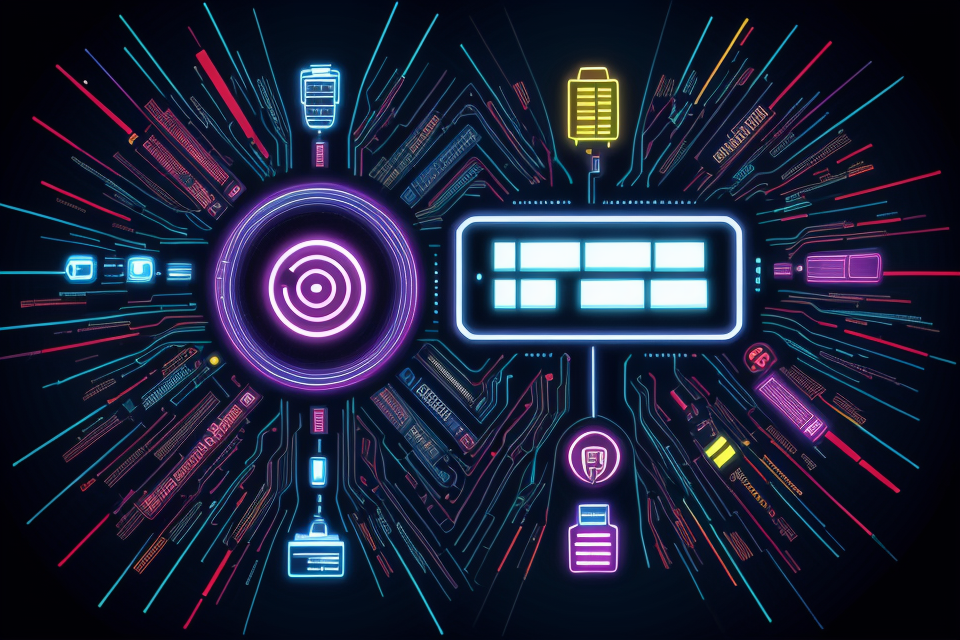In today’s fast-paced digital world, the internet has become an integral part of our lives. From communication to entertainment, shopping to education, it has transformed the way we live and work. But what exactly is an internet service? In simple terms, an internet service is a means of providing access to the internet. This can be done through various types of internet connections, such as broadband, DSL, cable, and satellite. In this article, we will explore the different types of internet services available today and what makes them unique. So, let’s dive in and discover the world of internet services!
What is the Internet?
The history of the internet
The history of the internet dates back to the 1960s when the United States government, through the Advanced Research Projects Agency (ARPA), began funding research on computer networking. The first internet prototype, known as the ARPANET, was developed in 1969 by Vint Cerf and Bob Kahn. This early network connected several computers at the University of California, Los Angeles (UCLA) and the Stanford Research Institute (SRI).
Over the next few decades, the internet continued to grow and evolve. In the 1980s, the National Science Foundation (NSF) funded the development of a more widespread network called NSFNET, which connected academic and research institutions across the United States. The proliferation of personal computers in the 1990s led to the creation of the World Wide Web by Tim Berners-Lee, which made the internet accessible to a wider audience.
Today, the internet is a global network of interconnected computer networks that allows users to access a vast array of information and communicate with each other in real-time. The internet has revolutionized the way we live, work, and communicate, and it continues to evolve and expand at an exponential rate.
How the internet works
The internet is a global network of interconnected computers and servers that allows for the sharing of information and data between devices. At its core, the internet is a system of interconnected networks that use standardized protocols to communicate with each other. These protocols, such as the Transmission Control Protocol (TCP) and the Internet Protocol (IP), allow devices to send and receive data across the network.
The internet works by using a system of routers and switches to direct traffic between devices. When a user sends a request to access a website or send an email, the request is sent to the user’s Internet Service Provider (ISP), which directs the request to the appropriate destination using a system of interconnected networks.
In addition to TCP and IP, the internet also relies on a number of other protocols and technologies to function properly. For example, the Domain Name System (DNS) is used to translate human-readable domain names, such as www.example.com, into IP addresses that computers can understand.
Overall, the internet is a complex and interconnected system that allows for the sharing of information and data on a global scale. Understanding how the internet works is essential for understanding the different types of internet services that are available today.
Types of Internet Services
Broadband Internet
Broadband Internet is a type of high-speed internet service that is available in many parts of the world. It provides fast and reliable internet connectivity to users, allowing them to access a wide range of online services and applications. There are several types of broadband internet services available today, including DSL, cable, and fiber optic.
DSL
DSL (Digital Subscriber Line) is a type of broadband internet service that uses existing telephone lines to provide high-speed internet connectivity. DSL technology works by using a different frequency range for internet data, allowing users to access the internet while still making phone calls. DSL is widely available in urban areas and offers download speeds of up to 100 Mbps.
Cable
Cable internet is another popular type of broadband internet service that uses cable TV networks to provide high-speed internet connectivity. Cable internet services are available in many parts of the world and offer fast download and upload speeds, as well as low latency. Cable internet services are known for their reliability and availability in urban and suburban areas.
Fiber Optic
Fiber optic internet is a type of broadband internet service that uses fiber optic cables to provide high-speed internet connectivity. Fiber optic cables are made of thin strands of glass or plastic that transmit data using light signals. Fiber optic internet services are known for their high download and upload speeds, low latency, and reliability. They are widely available in urban areas and are becoming increasingly popular in rural areas as well.
Overall, broadband internet services have revolutionized the way we access the internet, providing fast and reliable connectivity to users around the world. With a wide range of options available, including DSL, cable, and fiber optic, users can choose the type of broadband internet service that best meets their needs.
Mobile Internet
3G
3G, or third-generation mobile internet, was introduced in the early 2000s and offered significant improvements over its predecessor, 2G. It provided faster data transfer rates, allowing for more efficient web browsing and multimedia services such as video calls and mobile TV. 3G networks operate on a range of frequencies, including GSM, CDMA, and WCDMA.
4G
4G, or fourth-generation mobile internet, is a more recent development that offers even faster data transfer rates than 3G. It provides an improved user experience for mobile internet users, including faster download and upload speeds, lower latency, and greater network capacity. 4G networks are based on the WIMAX and LTE technologies, and they provide a more seamless and reliable connection for users.
5G
5G, or fifth-generation mobile internet, is the latest generation of mobile internet technology. It promises even faster data transfer rates, lower latency, and greater network capacity than 4G. 5G networks use a range of technologies, including millimeter waves, Massive MIMO, and network slicing, to provide a more efficient and reliable connection for users. 5G is expected to enable new applications and services, such as virtual and augmented reality, autonomous vehicles, and the Internet of Things (IoT).
Satellite Internet
Satellite Internet is a type of internet service that provides connectivity to remote or hard-to-reach areas, where traditional broadband internet services are not available. The service uses communication satellites orbiting the Earth to provide internet access to customers.
Geostationary satellite
Geostationary satellites are stationary satellites that remain fixed in their position relative to the Earth’s surface. They are used for providing satellite-based internet services over a wide geographic area. These satellites are located at an altitude of approximately 36,000 kilometers above the Earth’s surface.
Low Earth orbit satellite
Low Earth orbit (LEO) satellites are satellites that orbit the Earth at a much lower altitude than geostationary satellites. They are used for providing internet services to remote or hard-to-reach areas, such as rural or coastal regions. LEO satellites are typically used for providing broadband internet services to customers in areas where traditional broadband services are not available.
Dial-up Internet
How it works
Dial-up Internet is one of the earliest forms of Internet connectivity. It works by connecting to the Internet through a telephone line. The user’s computer is connected to the Internet through a modem, which is a device that converts the digital data from the computer into analog signals that can be transmitted over the telephone line. The modem dials a phone number to connect to an Internet service provider (ISP), and the user is then connected to the Internet.
Advantages and disadvantages
One advantage of dial-up Internet is that it is relatively inexpensive compared to other forms of Internet connectivity. It is also widely available, as it can be accessed through any telephone line. However, the speed of dial-up Internet is relatively slow, and it can be disrupted by phone calls or other activities that use the telephone line. Additionally, dial-up Internet requires a dedicated phone line, which can be inconvenient for users who need to use the phone while they are connected to the Internet.
In conclusion, dial-up Internet is an older form of Internet connectivity that is relatively inexpensive and widely available, but it has slower speeds and requires a dedicated phone line.
Internet Protocol (IP) Services
IP version 4 (IPv4)
IPv4 is the fourth version of the Internet Protocol, which is the primary protocol used to transmit data over the internet. It is a connectionless protocol that relies on a network layer to provide reliable end-to-end communication. IPv4 is widely used and supported, but it has limitations due to its finite number of available IP addresses.
IP version 6 (IPv6)
IPv6 is the sixth version of the Internet Protocol, and it is designed to address the limitations of IPv4. It has a much larger address space, which allows for more devices to be connected to the internet. IPv6 also includes improvements in security, mobility, and auto-configuration. While IPv6 is not yet as widely adopted as IPv4, it is becoming increasingly important as the number of internet-connected devices continues to grow.
Factors to Consider When Choosing an Internet Service
Speed
When choosing an internet service, speed is an essential factor to consider. Speed refers to the rate at which data is transmitted from the internet service provider (ISP) to the customer’s device. The speed of the internet service determines how quickly web pages load, videos stream, and files download.
There are different types of internet services available today, each with varying speeds. The most common types of internet services are:
- Dial-up: This is the slowest type of internet service, with speeds ranging from 56 kbps to 128 kbps.
- DSL: Digital Subscriber Line is a type of internet service that uses existing telephone lines to provide high-speed internet access. DSL speeds can range from 1 Mbps to 100 Mbps.
- Cable: Cable internet is faster than DSL, with speeds ranging from 10 Mbps to 500 Mbps.
- Fiber-optic: Fiber-optic internet is the fastest type of internet service, with speeds ranging from 100 Mbps to 1 Gbps.
It is important to note that the speed of an internet service can also depend on other factors such as the number of devices connected to the network, the distance between the ISP and the customer’s device, and the quality of the customer’s device. Therefore, it is crucial to consider these factors when choosing an internet service that meets your needs.
Reliability
When it comes to choosing an internet service, reliability is a critical factor to consider. It refers to the ability of the internet service provider (ISP) to consistently deliver a stable and uninterrupted internet connection. A reliable internet connection ensures that you can perform your online activities without any interruptions or disruptions.
There are several factors that can affect the reliability of an internet connection, including:
- Network coverage: The quality and coverage of the network can impact the reliability of the internet connection. ISPs with wider network coverage tend to be more reliable.
- Infrastructure: The infrastructure of the ISP, including the cables, routers, and other equipment, can affect the reliability of the internet connection. ISPs with well-maintained infrastructure tend to be more reliable.
- Maintenance: Regular maintenance and upgrades can help to ensure that the infrastructure remains in good condition and can provide a reliable internet connection.
- Peak usage: High levels of usage during peak hours can impact the reliability of the internet connection. ISPs with robust networks and sufficient bandwidth can handle high levels of usage without impacting the reliability of the connection.
In conclusion, reliability is a critical factor to consider when choosing an internet service. It is essential to choose an ISP that can consistently deliver a stable and uninterrupted internet connection to ensure that you can perform your online activities without any interruptions or disruptions.
Cost
When it comes to choosing an internet service, cost is undoubtedly one of the most important factors to consider. After all, everyone has a budget they need to stick to, and no one wants to pay more than they have to for their internet service.
There are a few different factors that can affect the cost of your internet service. One of the most important is the type of internet service you choose. Different types of internet services, such as DSL, cable, and fiber optic, can vary significantly in price, with fiber optic being the most expensive and DSL being the most affordable.
Another factor that can affect the cost of your internet service is your location. Some areas may have only one or two internet service providers, which can drive up prices. Additionally, if you live in a rural area, you may have to pay more for internet service due to the higher costs of providing service in these areas.
Finally, the package you choose can also affect the cost of your internet service. Many internet service providers offer different packages with varying levels of speed and data, and the package you choose can significantly impact your monthly bill.
Overall, when it comes to cost, it’s important to shop around and compare different internet service providers to find the best deal for your needs. Consider your budget, your location, and the package you need to determine which internet service provider and plan is the best fit for you.
Availability
When it comes to choosing an internet service, availability is a crucial factor to consider. It is important to determine whether the internet service provider (ISP) offers its services in your area. In some cases, ISPs may have limited coverage in certain regions, making it difficult to access their services.
It is also essential to consider the availability of different types of internet services in your area. For instance, some ISPs may only offer cable or DSL internet services, while others may provide fiber-optic or satellite internet services. It is important to research the different types of internet services available in your area and determine which ones are the most suitable for your needs.
Moreover, availability can also refer to the availability of bandwidth. Bandwidth refers to the amount of data that can be transmitted over an internet connection. It is important to choose an internet service that provides sufficient bandwidth to meet your needs. For instance, if you frequently stream videos or play online games, you will require a high-speed internet connection with ample bandwidth to ensure smooth and uninterrupted performance.
It is also worth noting that the availability of different types of internet services can vary depending on the location. Urban areas may have more internet service providers and a wider range of internet services available compared to rural areas. Therefore, it is essential to research the internet service providers in your area and compare their offerings to determine which one meets your needs.
The Future of Internet Services
Emerging technologies
The future of internet services is shaped by emerging technologies that are designed to improve user experience, increase connectivity, and enhance the capabilities of the internet. Here are some of the emerging technologies that are expected to have a significant impact on the future of internet services:
5G Networks
5G networks are the latest generation of mobile networks that offer faster speeds, lower latency, and increased capacity compared to previous generations. With 5G, users can expect to experience faster download and upload speeds, lower latency, and more reliable connections. This technology is expected to revolutionize the way we use the internet, enabling new applications such as virtual reality, augmented reality, and the Internet of Things (IoT).
Edge Computing
Edge computing is a distributed computing paradigm that brings computing resources closer to the edge of the network, closer to the end-users. This technology allows for faster processing and response times, reduces the need for bandwidth, and improves security. Edge computing is expected to become increasingly important as more devices are connected to the internet, and as the volume of data generated by these devices continues to grow.
Blockchain
Blockchain is a decentralized, distributed ledger technology that allows for secure, transparent, and tamper-proof transactions. Blockchain has the potential to revolutionize the way we use the internet, enabling new applications such as secure data sharing, digital identity management, and decentralized finance.
Quantum Computing
Quantum computing is a new type of computing that uses quantum-mechanical phenomena, such as superposition and entanglement, to perform operations on data. Quantum computing has the potential to solve problems that are currently impractical or impossible to solve with classical computers, such as cracking certain types of encryption. This technology is expected to have a significant impact on fields such as cryptography, chemistry, and materials science.
Overall, emerging technologies are shaping the future of internet services, and they have the potential to transform the way we use the internet in the years to come.
Potential challenges and opportunities
As the world becomes increasingly dependent on the internet, the future of internet services holds both challenges and opportunities.
One of the biggest challenges facing the internet is the issue of cybersecurity. With more and more personal and sensitive information being stored online, the risk of data breaches and cyber attacks is on the rise. This poses a significant threat to individuals, businesses, and governments alike, and will require the development of new technologies and strategies to protect against these threats.
Another challenge facing the internet is the issue of net neutrality. As internet service providers seek to control the flow of information and limit access to certain websites and services, there is a risk that the internet will become less open and less accessible to all. This could have a profound impact on the ability of individuals and businesses to access and share information, and could stifle innovation and creativity.
Despite these challenges, there are also many opportunities for the future of internet services. One of the most significant is the potential for the internet to become an even more integral part of our daily lives. With the rise of smart devices and the internet of things, the internet will become more deeply embedded in the fabric of our society, and will offer new and innovative ways for individuals and businesses to connect and interact.
Additionally, the future of internet services will be shaped by the ongoing development of new technologies and services. From 5G networks to artificial intelligence and virtual reality, there are many exciting developments on the horizon that will transform the way we use the internet and offer new opportunities for innovation and growth.
Overall, while the future of internet services holds both challenges and opportunities, it is clear that the internet will continue to play a central role in our lives and our economy for years to come.
FAQs
1. What is an internet service?
Internet service is a type of service that allows users to access the internet. It can be provided by internet service providers (ISPs) through various technologies such as digital subscriber line (DSL), cable, fiber optic, and satellite.
2. What are the different types of internet services available today?
There are several types of internet services available today, including DSL, cable, fiber optic, satellite, and mobile broadband. Each type of internet service has its own advantages and disadvantages, and the choice of service depends on the user’s needs and location.
3. What is DSL internet service?
DSL (Digital Subscriber Line) is a type of internet service that uses existing telephone lines to provide high-speed internet access. It is widely available in urban areas and is often a cost-effective option for users who already have a landline phone.
4. What is cable internet service?
Cable internet service is a type of internet service that uses the same cables that provide cable TV service to provide high-speed internet access. It is widely available in urban and suburban areas and is often a good option for users who already have cable TV service.
5. What is fiber optic internet service?
Fiber optic internet service is a type of internet service that uses fiber optic cables to provide high-speed internet access. It is a newer technology that is not yet widely available, but it offers faster speeds and more reliable connections than other types of internet service.
6. What is satellite internet service?
Satellite internet service is a type of internet service that uses satellites in orbit around the earth to provide high-speed internet access. It is available in most areas, but it can be more expensive than other types of internet service and may have data usage limits.
7. What is mobile broadband internet service?
Mobile broadband internet service is a type of internet service that uses cellular networks to provide high-speed internet access through mobile devices such as smartphones and tablets. It is a convenient option for users who are on the go, but it may not be as fast or reliable as other types of internet service.



